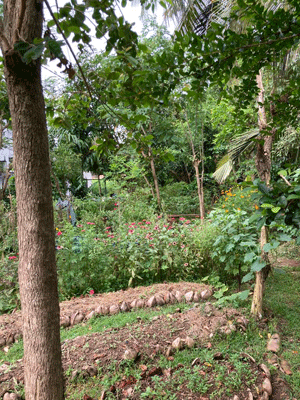Growing veggies: A few tips to get it right

Getting started: ECO-V volunteers helping to set up home gardens
More than two in three families in Sri Lanka do not have enough to eat according to a survey of 2300 families by Save the Children this month.
First seeing a considerable surge during the nationwide COVID lockdown in 2020, home gardening is being encouraged across the country as a means to combat the worsening food shortage, with agricultural institutions, experts and professionals urging the public to cultivate edible crops in their home gardens.
President of Eco Friendly Volunteers (ECO-V), Kanchana Weerakoon is one of those lending her expertise to help set up home gardens in Colombo. Founded in 2001, ECO-V has been promoting biodiversity conservation among local communities by empowering them with knowledge and skills to protect their own environment, based on Buddhist philosophy. ECO-V has run two flourishing urban gardens, an eco-garden and Metta garden near its office in Boralesgamuwa since 2013.
Kanchana encourages beginners to evaluate the challenges and limitations of the space available to them and understand what can be accomplished within that space before starting out. The basics, she says, are adequate space, direct sunlight and good ventilation. The amount of sunlight needed depends on the type of crop – 6-8 hours of direct sunlight is usually needed.
 Senior Lecturer from the Department of Agricultural Biology at the University of Ruhuna, Professor Nalika Ranathunge adds that it is imperative to have a steady supply of water and determine the kind of soil available in each space before planting. Areas abundant in gravel or sand are not ideal for gardening purposes as this can impede the flow of water and nutrients and impact the roots of the plants which need sufficient oxygen and nutrients to develop. The soil should be well graded and fertile to support a plant’s growth while a basic potting mix should comprise both topsoil and compost mixed together in a 1-1 ratio.
Senior Lecturer from the Department of Agricultural Biology at the University of Ruhuna, Professor Nalika Ranathunge adds that it is imperative to have a steady supply of water and determine the kind of soil available in each space before planting. Areas abundant in gravel or sand are not ideal for gardening purposes as this can impede the flow of water and nutrients and impact the roots of the plants which need sufficient oxygen and nutrients to develop. The soil should be well graded and fertile to support a plant’s growth while a basic potting mix should comprise both topsoil and compost mixed together in a 1-1 ratio.
When choosing which crops to grow, Prof. Ranathunge adds that it is important to know which seeds can be planted directly into the soil or a pot and grown successfully under direct sunlight and which need to be raised as plantlets in a controlled environment with moisture and less sunlight until they are ready to be transferred into larger pots and introduced to regular, direct sunlight. Varieties suitable for direct planting are radish (which can take up to 30 days to develop into full foliage), okra, winged beans, ‘mekaral’ or long beans, snake gourd, pumpkin and cucumber. Seeds which need to be germinated separately include tomatoes, chillies, cabbage and lettuce which she says should be ready to be transferred within a month.
For those living in smaller or more confined spaces like an apartment complex, Kanchana recommends starting a container garden in any balcony or terrace setting. Chillies, tomatoes, gotu kola, spinach or ‘mukunuwenna’, lemongrass and malabar spinach or ‘nivithi’ are some of the easier vegetables for beginners to grow.
A vertical gardening strategy can be used to maximize limited space, Prof. Ranathunge suggests. This ergonomic method of gardening involves stacking the containers on vertical panels, using a trellis support or attaching containers to the wall if the complex permits.

Kanchana Weerakoon
Everyday household items such as empty ice cream containers, mega soft drink bottles, milk cartons, clay pots, old buckets and basins, jute rice bags and wooden food crates can all be used to grow plants. Kanchana recommends that shallow containers such as the bottles are more suitable for leafy vegetables like gotukola and onion leaves while Prof. Ranathunge says that the depth of a rice bag can be used to grow sweet potatoes. She adds that PVC pipes can also be used to create growth columns by filling the pipes with compost and potting mix and making holes in it to make room for leafy vegetables to develop. Plastics though are susceptible to damage due to the rain and sun and may break and cause pollution.
As an alterative Kanchana suggests natural or biodegradable containers like discarded coconut husks can also be used.
Maintaining plant health by providing much needed nutrients is also essential and many household items can be used to create compost. Types of food waste such as egg shells – abundant in calcium, and leftover fruit and vegetable peels can be incorporated in the compost, as well as dried leaves, Prof. Ranathunge adds.

Nalika Ranathunge
To protect crops from pests and harmful pathogens, Kanchana recommends growing natural insect repellants such as ‘Daspethiya’, lemon grass, ‘Thulasi’ or ‘holy basil,’ maduruthala’ and ‘Kohomba’ or Neem that can be sprayed to repel insects. Leftover onion peels can be used in a similar way by soaking it in water and spraying the affected plants. Prof. Ranathunge adds to the list: garlic, pepper and betel leaves can be effective repellents by crushing, blending or diluting them with water and spraying.
She also recommends growing local varieties of vegetables – tomatoes such as Lanka sour or ‘goraka takkali’, ‘avara’ beans, and roots and tubers – as opposed to the more commercially available edible crops as local varieties are more resistant to pests and diseases. “Only a part of your meal will be compensated by these kinds of home crops so in terms of pest control I encourage some diversity in your home garden. Do not fill all of your pots with one kind of crop. Having different varieties is unfavourable for pests and pathogens to grow,” she said.
Those looking to begin a home garden should refer the many instructional guides complete with tips and tutorials available on sights such as YouTube they both recommend.
Searching for an ideal partner? Find your soul mate on Hitad.lk, Sri Lanka's favourite marriage proposals page. With Hitad.lk matrimonial advertisements you have access to thousands of ads from potential suitors who are looking for someone just like you.


